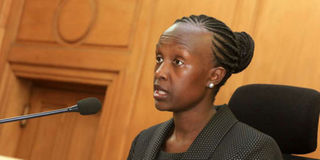LSK faults EACC move to probe Registrar Esther Nyaiyaki

Supreme Court Registrar Esther Nyaiyaki. The Law Society of Kenya terms move by the anti-corruption agency to probe her an attack against the independence of the Judiciary. PHOTO | JEFF ANGOTE | NATION MEDIA GROUP
What you need to know:
The EACC investigations against Ms Nyaiyaki were triggered by Rashid Mohamed who accused her of misleading the Supreme Court Judges in quashing the re-election of President Uhuru Kenyatta in the August 8 presidential election.
The Law Society of Kenya has faulted the Ethics and Anti-Corruption Commission move to investigate the Registrar of Supreme Court Esther Nyaiyaki saying it will amount to an attack on the independence of the Judiciary.
In a letter to the EACC chairman Mr Eliud Wabukala, LSK President Mr Isaac Okero said that the commission has no authority to intervene and “purport” to conduct an investigation against an officer of the Judiciary.
VIOLATION
Noting that Ms Nyaiyaki was acting on the interim orders of the Supreme Court, Mr Okero said that such an investigation against an officer of the Judiciary only be conducted by the organs of the Judiciary among them, the Judicial Service Commission.
“The Judiciary in the performance of its functions under the Constitution exercises delegated sovereign authority of the people of Kenya. It would be an affront to and violation of this sovereign authority for the EACC to proceed with the proposed enquiry and investigation,” Mr Okero said in the October 3 letter to EACC.
The EACC investigations against Ms Nyaiyaki were triggered by Rashid Mohamed who accused her of misleading the Supreme Court Judges in quashing the re-election of President Uhuru Kenyatta in the August 8 presidential election.
On September 25, the EACC, reacting on Mr Rashid’s letter, wrote to Chief Registrar of the Judiciary Ms Ann Amadi calling for the submission of documents used in the proceedings of the Supreme Court in the petition filed against the re-election of President Kenyatta.
Ms Nyaiyaki supervised a team of ICT experts appointed by the Judiciary to examine the materials that the independent Electoral and Boundaries Commission used to declare the presidential result among them forms 34As.
It its report to the judges, Ms Nyaiyaki’s teams established that the presidential election was fraught with massive irregularities among them over 560 ungazetted polling stations on top of the 40883 legally recognized stations.
It was also discovered that a huge number of forms 34As used to declare the presidential results at the polling stations were duplicated, were carbon copies, appeared photocopies while others had no evidence of being stamped or signed contrary to the law.
Others did not have watermarks, were not signed by the relevant personnel, had no serial numbers among other irregularities.
Mr Okero noted that it is only the Supreme Court that has the judicial and constitutional authority to investigate any complaint as to whether or not there has been compliance with its orders.



